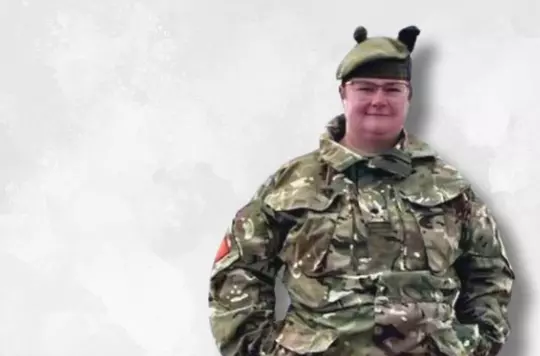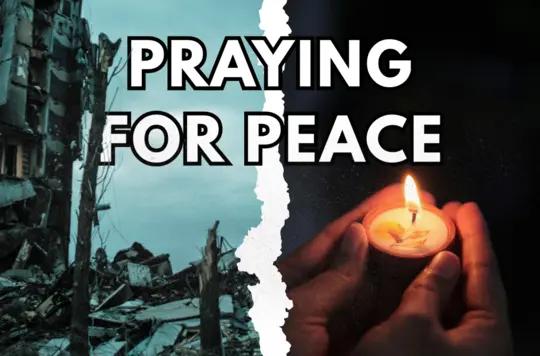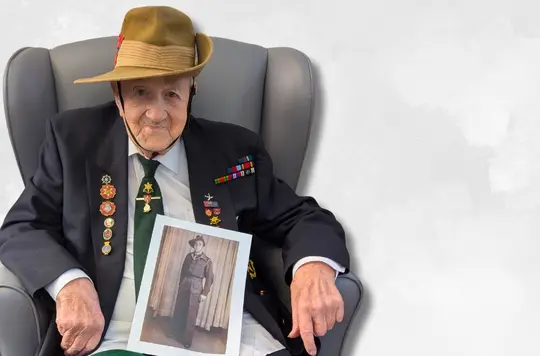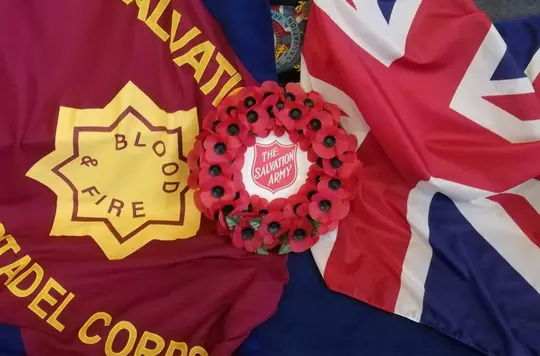8 November 2025
Remembrance Sunday: Serving in the Gulf War
George Tanton

Lieut-Colonel Geoff Blurton talks to George Tanton about serving with the Red Shield Services during the Gulf War.
Following Saddam Hussein’s invasion of Kuwait in August 1990, an international coalition of 42 countries, including the UK, went to war with Iraq. This conflict, known as the Gulf War, saw the biggest deployment of British servicemen since the Second World War. Alongside them were members of The Salvation Army’s Red Shield Services, providing both practical support and a listening ear.
The Salvation Army deployed a detachment of two mobile Red Shield canteens shortly before the commencement of the Allied ground offensive against Saddam’s forces. Following the liberation of Kuwait, one mobile unit operated from February to March 1991 in Kuwait City and the other in Al Bubail, Saudi Arabia. A second detachment was stationed in the Gulf from April to May 1991. Lieut-Colonel Geoff Blurton, then a major, was in charge of the latter.
‘It was decided there should only be two deployments because of the potential danger to officers, and the fact that we had other appointments in the UK,’ reminisces Geoff. ‘All eight of us were volunteers. There was certainly no pressure or arm-twisting for officers to go.’
For Geoff, the motivation came from his connections at Kettering Citadel, where he was corps leader at the time.
‘A young man at the corps was also in Her Majesty’s forces. He was sent out to the Gulf as a signals officer. That was the trigger to go in my case. I was also well aware of the first team that were already out there.’
Upon volunteering, Geoff and his colleagues were sent to RAF Brize Norton, Britain’s largest military aviation base. From there, they were flown out along with their mobile canteens.
Throughout his time in the Gulf, Geoff kept a handwritten journal, detailing every aspect of serving alongside the British forces stationed in Kuwait and Saudi Arabia.
‘I jotted down notes about the things that happened,’ he explains. ‘I included logistics, as well as my thoughts and feelings about the problems we encountered. As the team leader, I was invited to the daily operational briefings by the commanding officer of the Royal Logistics Corps that we were attached to. We were very much involved with the military on a day-to-day basis. I knew what they were doing and even what they were thinking.’
Walking around camp in their desert camouflage military uniforms, Geoff reveals that he and his team were often mistakenly addressed as military officers by servicemen.
‘The embarrassing thing was that soldiers would want to salute us. We kept saying “we haven’t got the Queen’s Commission”,’ he jokes. Upon entering Kuwait, Saddam’s forces were in retreat and the work of the military involved mainly peacekeeping. However, Geoff and his team were still acutely aware that they had entered an active war zone: ‘We were walking around the desert, aware that the Iraqis had placed landmines everywhere. There was certainly an element of danger.’
Geoff’s team were involved in providing refreshments to British troops, as well as offering a listening ear and guidance in moral and spiritual matters.
‘There were lots of opportunities to talk to the soldiers about their fears or families,’ he explains. ‘There were some who wanted to discuss the politics of the war, others wanted to discuss the moral side. Even some of the senior officers were asking, “What are we doing here?” We were all things to all people; whatever they wanted to talk about, we would talk to them about it.’
In some cases, Geoff and his team supported British troops in more practical ways. Geoff remembers that a soldier, worried that his wife would not receive any flowers on their wedding anniversary, asked him to intervene.
‘She received a bunch of flowers, courtesy of The Salvation Army, delivered to her door by the local florist,’ he fondly relates.
‘There’s one interaction that always sticks with me,’ he continues. ‘A sergeant once said to me that that we brought normality to an abnormal situation.
I asked him what he meant by that. He explained: “Well, there’s nothing more normal than the Sally Army on the street corner. When you get out here into the desert, the last thing you expect to see is the Sally Army setting up a vehicle with crisps, filled rolls and Coca-Colas!”’
Geoff recalls the destruction caused by the war: ‘Sadly, we came across bodies. I don’t ever recall getting close to the fighting. Going into Kuwait from Saudi Arabia was a real eye-opener. There was such devastation caused there and vandalism. Buildings were in ruins and ransacked. We went past several car showrooms with lines of Mercedes all totally destroyed.’
Upon returning to the UK, Geoff admits that he struggled to acclimatise: ‘It was difficult to forget and I had constant reminders. Sometime after getting back, I was in a pub in Kettering. There was a young man, not in uniform, but standing to attention. He remembered me from the Gulf. “Good to see you sir!” he said to me.’
‘War is always a waste,’ Geoff laments. ‘It is a waste of muscle, a waste of manpower, a waste of everything.’
Looking back upon his time in the Gulf, he reflects on the state of the world today, including the conflict in Ukraine.
‘It grieves me that in Kyiv there is such devastation going on,’ he observes.
Considering how humanity can rebuild after such devastation and bloodshed, he highlights the need for peace, friendship and fellowship above all: ‘Irrespective of what has gone on, and the rights and wrongs, in the end I suppose those things don’t matter when you are picking up the pieces at the end of a war.’
Discover more

Captain Amy-Jo Battersby (Parkhead with Dennistoun) talks to Major Lynne Shaw about war, Remembrance Sunday and the difference love makes.

Resources to lead prayers for peace during gathered worship, in a meaningful and transformative way.

As he celebrates his 100th birthday, Vic Stone shares how The Salvation Army has supported him through war and peace.
